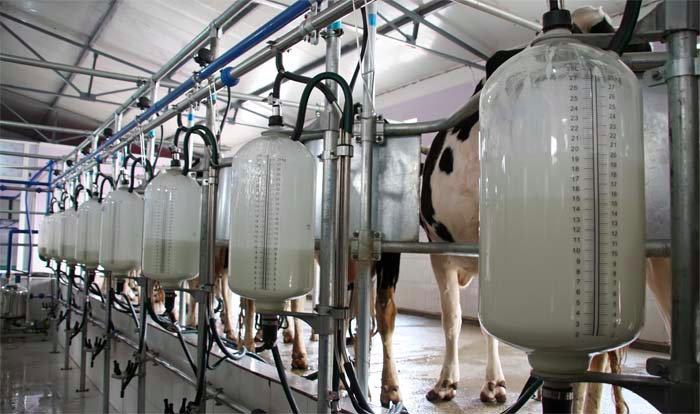
A report that claims British consumers are unaware of a 'stealth' introduction of intensive dairy farms which put livestock health at risk has been described as false by the NFU.
A report issued today by World Animal Protection UK, said tactics by developers include increasing farm sizes gradually.
It said one hundred intensive indoor dairy farms exist, but no official figures prove it.
"These systems can hold over 2,000 cows and now account for up to a fifth of the milk produced in the UK," the report claimed.
"Cows in these systems never go outside, are pushed to their limits to produce more milk, and are at a higher risk of suffering from lameness and udder infections."
Alyx Elliott, UK Head of Campaigns at World Animal Protection said, "We believe that the British public will be shocked about the number of intensive indoor dairy farms in the UK, especially when these systems put cows at an increased health risk and prevent them from expressing their natural behaviour.
"This century, countries such as Denmark have seen the majority of their cows moved to indoor intensive farms, without anyone noticing, and we do not want this to happen to us.
Mr Elliott said the UK is the world's 10th largest producer of milk but many farmers are selling milk at less than the cost of production.
"People are willing to pay more for free range milk – and they are already familiar with the ‘free-range’ concept – so this provides a fantastic opportunity for the dairy industry to create value in the milk we are producing. It means providing better labelling and replicating the great work pasture based dairy farmers are doing already."
Andrew Ayrton, pasture based dairy farmer in Skipton, Yorkshire, said: "Very few people are aware of intensive indoor dairy farming, and most believe that all cows go out to graze on grass.
"This way of farming causes lameness and health problems associated with standing in slurry all year. To go outdoors is a basic freedom that every cow should have.”
World Animal Protection UK is in discussions with nine supermarkets including Tesco, Aldi and Waitrose about providing free range milk labelling, and last week met with Defra farming Minister George Eustice to discuss the opportunities free-range milk presents to the dairy industry.
Free range milk is already being produced in the UK on a small sca1le, providing a model that could easily be expanded across the country.
A recent World Animal Protection study found that there is no reason why it can’t be made widely available and a brand introduced with a minimum of 20,000 litres of milk supplying around 40 stores.
'No evidence'
NFU chief dairy adviser Sian Davies said UK dairy farmers take the health and welfare of their dairy cows 'extremely seriously'.
"Over 90% of the milk produced and consumed in the UK is inspected for environmental, animal health and welfare and food safety standards under the Red Tractor scheme and consumers can be confident in dairy products that display the Red Tractor logo.
"It is a fact that dairy farms have increased in size over the years – we now have around 1.895 million dairy cows on 13,355 dairy farms in the UK and the average herd size is around 123 cows according to AHDB."
"Unlike what WAP state there is no evidence to prove that the health and welfare of the dairy cow is compromised due to the scale or the system of the farm. Far more important is the management of the system to best suit the needs of the cow."
